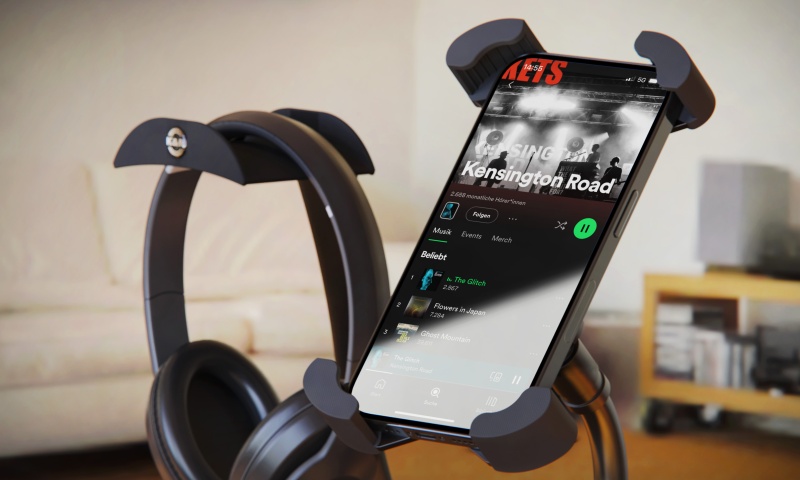License music rights
Guest blogger 04.04.2025

Music is not really tangible. You can’t sell a sound. A medium on which there is a sound, however, is something to work with. We speak of “rights” for everything that is intangible. And these rights belong to someone, can be granted, transferred and even sold in the USA.
So far, so good.
Disclaimer: The author (that’s me) is not a lawyer and does not give any legal advice. Be sure to consult a specialist. However, the author has to deal with music rights on a daily basis, namely when he grants television stations and film production companies the rights to use his music in their productions. He has also written a book on the subject. Okay, that should be enough. Enough with the third person.
Let’s start with what rights exist to your music.
You write a song, and yes, you’ve probably heard it everywhere, at that moment you also become the creator of your song. Provided you really have made it up yourself. Consequently, you also own the famous copyrights to your song.
So far, however, the idea has only been buzzing around in your head and the best you can do is sing it to someone. But to capture your work for eternity, you have to record it. The result is a recording of your song: you can hear what you have played, sung and produced. Voilà, the rights to the recording, usually referred to as “master rights”. And if you have made this recording completely on your own, the master rights belong to you alone.
These two rights are the ones that are at stake if you want to give away your music for a movie, a TV show, a commercial or a computer game.
You may be able to do this completely on your own, but you may also need a few helpers. Let’s assume the latter, not because I don’t think you are capable, but so that you can understand the topic even better and in full.
Let’s take a closer look at who else may be involved in the copyrights and master rights before we dive into the practicalities.
Parties involved in the copyrights
Clearly, everyone who contributed to the composition of your song is involved in the copyright. In most cases, authors, i.e. composers and lyricists, give their music to a music publisher. It’s great if you can find a committed publisher who will actively promote your song to TV stations, production companies, advertising agencies and game manufacturers. There are publishers who specialize in exactly this, they usually call themselves “Music Library” or “Music Boutique”.
In recognition of his achievements, you grant your publisher the publishing rights to your song. This means that in future, if your song “runs” publicly thanks to his efforts, the publisher will receive from GEMA the publisher’s share of the royalties that GEMA has collected from the television stations, for example. The publisher’s share amounts to 33.3% of the royalties paid out by GEMA. You receive the remaining 66.6% or share it with other authors if they have contributed to your song as composers or lyricists.
In the USA, by the way, the copyright and publishing shares are split 50:50. This may be of interest to you, as the USA provides a very large breeding ground for music licensing.
Parties involved in the master rights
Everyone who was involved in the recording and production of your song is involved in the finished recording: You, the producers, sound engineers and any studio musicians. As a rule, you pay producers, technicians and studio musicians a one-off fee and – contractually! – their ancillary copyrights to you. If your recording makes money, you no longer have to give them a share (of course you can also come to a different agreement with them). Instead, producers, technicians and studio musicians receive a “supplementary payment” from the copyright collection society (GVL) if your song is further exploited. But that is a science in itself.
Normally, you get a record company on board so that they can send the finished recording of your song out into the world so that they can earn money. Be it on recordings, via download, via stream or even in movies or on television.
In order for the record company to be allowed to do all this for you, you must give it permission to do so by granting it the rights to your recording, i.e. the master rights.
If the record company succeeds in placing your song in a film, for example, it grants the production company a license. It is called a “master license”. And that costs money. Depending on how well known you are, this could be a few hundred euros or even a six-figure sum.
The money that the record company earns for this is split equally 50:50 with you. At least that is the international industry standard.
Summary
Now that a music publisher has the say over your composition and the record company can decide on your recordings, all those who want to use your music must obtain permission from both the publisher and the record company:
From the publisher to use the composition.
From the record company to use the recording of it.
Remember that. Please. Without fail.
But what if you have neither a publisher nor a record company? Then you alone control your composition and its reception. You are therefore the author, publisher and record company in one and can grant all licenses yourself, both for the use of the composition and for the use of the master recording. But I think it’s important that you are aware of your different roles as a publisher on the one hand and as a record company on the other, because that’s the only way to really understand how this business works.
Two income streams
Once your music has been placed in, say, a TV movie, you’ll get paid twice:
Firstly, the master license (which you get paid immediately by the production company), and then in the form of royalties when the film with your music is broadcast on television. This will take a little longer, as the royalties must first be collected by GEMA before they are paid out to you according to their distribution plan.
How can you place your song?
The direct route into films and major television productions is via so-called “music supervisors”. They are either employed directly by the production companies and broadcasters or act as freelancers on their behalf. Their job is to find the right music and, as they say, to clear the rights to it. In other words, to obtain the necessary licenses.
In smaller TV productions, it’s the music editors or the people in the editing room who take care of the music, whereas in low-budget indie films, it’s usually the directors who are your contacts.
It all sounds quite nice if these people weren’t so hard to find and even harder to convince. They receive over 100 music mailings every day, so the chance of getting lost is unfortunately quite high. Are there alternatives? Yes.
Music Library / Music Boutique
You have already read about them above. They combine the activities of music publishers and record companies and thus serve as the sole point of contact for potential music users. This speeds up the licensing process immensely.
You can contact these libraries or boutiques and ask them to include your song – or several songs – in their program and offer them. In return, you grant them both the publisher’s share of your composition and the usual 50% of the master licenses.
For real “sung” songs, please make sure that you grant the library all rights on a non-exclusive basis only, so that you still have the right to publish your songs yourself, perform them live or place them in films without the library earning any money from them.
If you decide to make functional, purely instrumental background music, exclusive contracts with the libraries are fine, almost standard by now.
Sync Agent
A sync agent is someone who searches for you to place your song in movies, television, commercials and computer games. The word “sync” here comes from “synchronize”, a term that is often used in the industry. This refers to the integration of music and moving images.
The Sync Agent will mainly look for opportunities for you and your song that yield reasonable master licenses. In return, he will demand a share of the revenue, which can range from a standard agent or manager share of around 20% to the 50% that a record company or library would receive for granting the master rights.
Now you have learned the basics of music licensing. The topic has remained one of the few constants in the music business and is also being increasingly pursued by the major record companies. There is still good money to be made here.
Best regards,
Julian Angel
musicbizmadness




